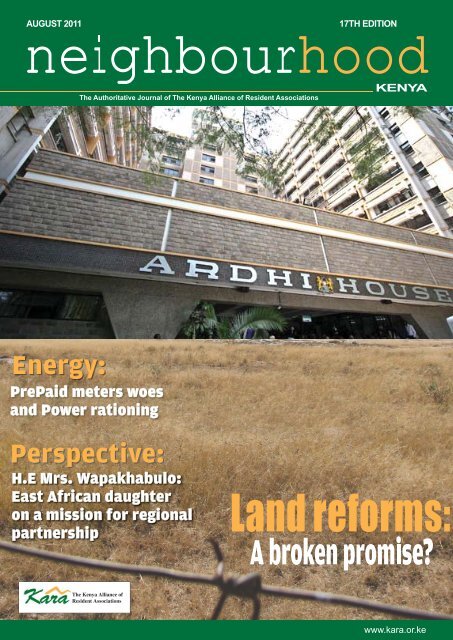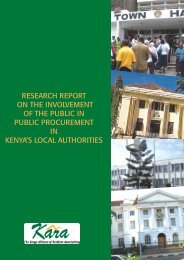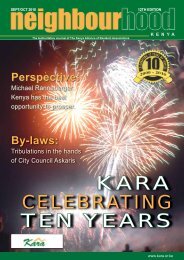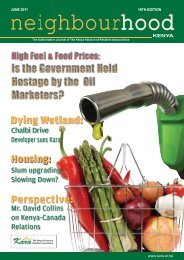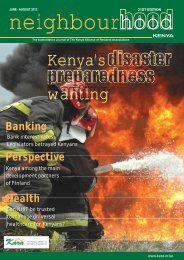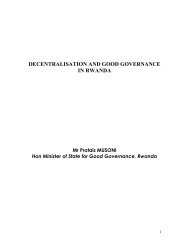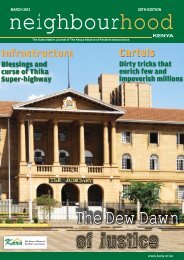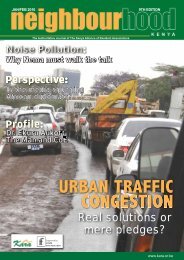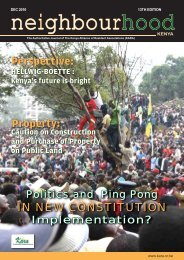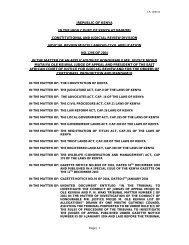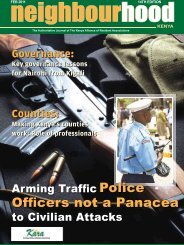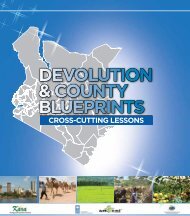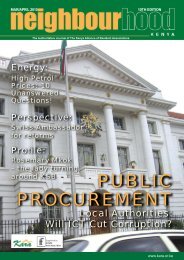KARA AUGUST 2011 ISSUE.indd
KARA AUGUST 2011 ISSUE.indd
KARA AUGUST 2011 ISSUE.indd
You also want an ePaper? Increase the reach of your titles
YUMPU automatically turns print PDFs into web optimized ePapers that Google loves.
17TH EDITION<br />
neighbourhood<br />
<strong>AUGUST</strong> <strong>2011</strong><br />
The Authoritative Journal of The Kenya Alliance of Resident Associations<br />
KENYA<br />
Energy:<br />
PrePaid meters woes<br />
and Power rationing<br />
Perspective:<br />
H.E Mrs. Wapakhabulo:<br />
East African daughter<br />
on a mission for regional<br />
partnership<br />
The Kenya Alliance of<br />
Resident Associations<br />
www.kara.or.ke
COVER STORY<br />
Note<br />
Editor’s<br />
Welcome to the 17 th edition of your<br />
favourite public service delivery<br />
focused journal. We appreciate<br />
your support and encouraging feedback.<br />
Kenya has once again found itself in the<br />
list of shame among the family of nations for<br />
not being able to feed itself. The stark reality<br />
of starving Kenyans amidst contentious denial<br />
by the Government spokesman has put the<br />
government on the spot regarding its long term<br />
plan on food security for the country.<br />
We salute Kenyans who through the<br />
Kenyans for Kenya initiative demonstrated<br />
unprecedented solidarity and generosity to raise<br />
funds and donate food to save our starving<br />
brothers and sisters. We expect that this time<br />
round the Government has learnt its lessons<br />
the hardest and that long term measures will be<br />
put in place to address food insecurity in Kenya<br />
once and for all.<br />
On a different note, consumers of electricity<br />
are feeling short-changed by the Kenya Power’s<br />
(KP) prepaid meters initiative. Complaints<br />
range from lack of pre-installation education to<br />
unusually high power bills due to faulty meters.<br />
Read our evaluation of the prepaid meters<br />
initiative and why KP must take responsibility<br />
for the suffering of its customers.<br />
Kenyans have been waiting for reforms<br />
in the land sector for decades. However, the<br />
much touted reform in the sector appears to<br />
be encountering challenges and slowing down<br />
all-together. Is the Minister for Lands, a highly<br />
accomplished advocate for reforms, equal to<br />
the task of reforming the land sector? Read our<br />
analysis on progress and shortcomings of the<br />
reforms.<br />
Following the recent attainment of<br />
independence by the Republic of South Sudan,<br />
there are mixed feelings among Kenyans on<br />
what this portends for them. We provide expert<br />
analysis of some of the anticipated opportunities<br />
and challenges that may come with the great<br />
milestone achieved by South Sudan.<br />
Also read about the talented Kenyan youth<br />
and their level of preparedness in managing the<br />
fame and fortune that follows their success. Is<br />
Kenya doing enough to prepare the youth and<br />
ensure that they don’t become victims of their<br />
own success?<br />
As always, we look forward to your<br />
continued support in realising accelerated<br />
access to public service delivery. Karibuni!<br />
Land reforms<br />
remain a<br />
pipe dream<br />
Lands Minister James Aggrey Bob Orengo<br />
Reforms in the public sector seem<br />
alien to Ardhi House, the seat of<br />
the Ministry of Lands, given the<br />
pace and attitude it has adopted.<br />
Fed up with the state of affairs at the<br />
Ministry, the legal fraternity led by Law<br />
Society of Kenya chairman Ken Akide and<br />
Kenya Anti-Corruption Commission chief<br />
Prof. Patrick Lumumba recently organised<br />
a demonstration in Nairobi. They accused<br />
minister James Orengo of being soft on<br />
corrupt officials in his Ministry.<br />
The minister denies sleeping on the job.<br />
“When dealing with land issues you have to<br />
be cautious because you are dealing with<br />
some people, some of who have rights,” he<br />
said.<br />
Mr Orengo says people must consider<br />
both the negative and positive steps made,<br />
instead of blanket condemnation. So far,<br />
he said, critics have decided to ignore the<br />
Ministry’s efforts to repossess more than<br />
1,200 properties across the country.<br />
“We have repossessed land belonging to<br />
the judiciary, police, Ministry of Health and<br />
other public property in Nairobi, Kisumu,<br />
Mombasa, Eldoret, Kisii, Meru, Eldoret,<br />
Kakamega, Kwale and Malindi,” he said.<br />
Prof Lumumba thinks otherwise, and<br />
shares the view with many Kenyans who<br />
doubt the government’s commitment and<br />
will to eradicate corruption in the Ministry.<br />
Mukarara, who resides in the US posed:<br />
“If you pay for the title deed how long should<br />
you wait for it?” he says he paid his family<br />
attorney title deed fee and the lawyer has<br />
been telling him that there is shortage of<br />
titles. “Now he is telling me about gazetting<br />
the land again.” he even gave his e-mail<br />
(equatorjim@aol.com) for assistance. This<br />
is not uncommon in Kenya as staff at the<br />
Ministry collude with lawyers and valuers to<br />
defraud innocent citizens.<br />
The question remains unanswered: what<br />
would happen if the Ministry implemented<br />
the famous Ndung’u land report which is<br />
now gathering dust in the shelves of the<br />
Ministry and having cost the tax payer<br />
millions of shillings?<br />
Some people believe that the Ministry of<br />
Lands only has to implement the report in<br />
full and the rest would be history.<br />
“Instead what we hear is politicking.<br />
I never had any faith in Orengo after he<br />
3.
COVER STORY<br />
From Page 3<br />
Land reforms remain a pipe dream<br />
said that IDPs will not be resettled in their<br />
former lands. This, to me, displayed lack of<br />
understanding and leadership judgement.<br />
To this day, we still have IDPs in camps<br />
living horrendous lives and completely<br />
dependent on handouts,”<br />
Others believe that the rot at Ardhi<br />
House is deeply entrenched and requires<br />
time to be eliminated.<br />
A client of the Ministry who only<br />
identifi ed himself as Kusimbwa says,<br />
“Those who imagine that Orengo can get<br />
rid of the system in place within two years<br />
are lying to themselves. It takes goodwill on<br />
the part of leadership and the prosecution to<br />
curb corruption in the Ministry. The problem<br />
is that some of the Junior officers have<br />
accumulated so much wealth over the years<br />
and are able to pocket their seniors who<br />
might want to either transfer them to other<br />
ministries or suspend them. I say so from<br />
experience,” he said.<br />
Lands Permanent Secretary Dorothy<br />
Angote told the lawyers who had marched<br />
to the Ministry that the rot at the Ministry<br />
will not be solved by shouting but dialogue.<br />
Land remains a very prized asset in Kenya<br />
and discussions around it easily become<br />
emotional. It remains to be seen how the<br />
minister, known to be one of the most<br />
consistent and vocal advocate for reforms<br />
during Kenya’s ‘dark’ days, will realise<br />
reforms in his Ministry.<br />
“... the challenges we face are<br />
real. They are serious and<br />
they are many. They will not<br />
be met easily or in a short<br />
span of time. But know this<br />
America: They will be met.”<br />
When President Obama uttered<br />
these words to Americans at<br />
his inauguration on January<br />
21, 2009 little did he know that<br />
the same would apply to his<br />
fatherland Kenya.”<br />
Implementation Watch:<br />
Police vetting should<br />
have waited for the<br />
necessary laws<br />
That Kenya is struggling, and in most<br />
cases, fumbling with the implementation of the<br />
constitution is not in doubt.<br />
Several false steps have been made and<br />
blame game is part and parcel of the process.<br />
One of the false steps was the police vetting<br />
exercise that abruptly came to a halt.<br />
On the whole, police reforms are moving<br />
at slower pace than many would like, or<br />
envisaged.<br />
The vetting of police officers was put off<br />
until laws are in place to establish the Police<br />
Service Commission and the National Police<br />
Service.<br />
By then, the panellists from the Public<br />
Service Commission, Kenya Anti-Corruption<br />
Commission and National Security Intelligence<br />
Service had interviewed 1,114 senior police<br />
offi cers last month with the aim of retiring<br />
those found unfi t.<br />
The public had been excluded from the<br />
clandestinely run exercise as the police vetted<br />
itself on the account of taxpayers’ money.<br />
And with the pressure from the civil society<br />
unceasing, Vigilance House one morning<br />
decided to abandon<br />
the whole exercise.<br />
By then, millions of<br />
public funds had<br />
gone down the drain<br />
with little to show.<br />
Shouldn’t they<br />
have waited for<br />
the right time and<br />
environment to carry<br />
out the exercise? Or rather, shouldn’t they<br />
have invited their employers, the taxpayer,<br />
to listen into the evaluations? Why was the<br />
process allowed to go that far before being<br />
stopped?<br />
The Ransley report, adopted by the<br />
government to guide police reforms,<br />
recommended that senior officers from<br />
the rank of assistant commissioner be<br />
“subjected to a review against a criterion on<br />
professionalism, integrity, track record and<br />
psychological fitness.”<br />
Yet the manner the exercise started was<br />
bound to raise eyebrows. Security experts<br />
say Vigilance House was not interested in the<br />
exercise in the fi rst place but wanted to carry on<br />
with impunity as has been the case in the past.<br />
“They tested the waters and found the<br />
ocean depth unbearable,” says a member of<br />
the Usalama Reform Forum, a civil society<br />
lobby group dedicated to reforms in the security<br />
sector.<br />
The roles of the Attorney General<br />
Amos Wako and the Commission for the<br />
Implementation of the Constitution (CIC) also<br />
come into question. As the government’s chief<br />
legal adviser, Mr Wako should have told the<br />
police hierarchy how to go about the exercise<br />
after interpreting the constitution and the<br />
recommendations of the Ransley report.<br />
On the other hand, CIC ought to have<br />
exercised their oversight role in implementation<br />
to advise police to hold on until the necessary<br />
laws are in place.<br />
The implementation is therefore facing major<br />
hurdles as the August 27 fast approaches. It is<br />
the date after which any citizen of Kenya can<br />
go to court to compel parliament to pass any<br />
constitution implementation enabling law (s) or<br />
else have the parliament disbanded.<br />
Disclaimer:<br />
Neighbourhood Kenya is produced bi-monthly by The Kenya Alliance of Resident Associations (<strong>KARA</strong>) The opinion expressed in the articles are those of the authors and<br />
do not necessarily reflect <strong>KARA</strong>’s offi cial position. The editor welcomes contributions of articles and photographs from members of the public. Any materials received will<br />
be treated as unconditionally assigned for public and will be subject to <strong>KARA</strong>’s unrestricted right to edit and publish.<strong>KARA</strong> reserves the right of this publication and no<br />
part can be published in anyway without express permission.
PERSPECTIVE<br />
H.E Mrs. Wapakhabulo:<br />
The East African<br />
daughter on a mission<br />
for regional partnership<br />
Down to earth, God fearing,<br />
energetic and outgoing – these<br />
are the adjectives that come<br />
to mind upon meeting the Ugandan High<br />
Commissioner to Kenya and permanent<br />
representative to UN Habitat and UNEP,<br />
Her Excellency Mrs. Angelina Chogo<br />
Wapakhabulo for the first time. She<br />
considers herself a true daughter of East<br />
Africa, having been born and raised in<br />
Tanzania, married in Uganda and now<br />
working in Kenya.<br />
She has not been in the diplomatic<br />
circles and her posting to Kenya in August<br />
2009 was the fi rst diplomatic position in<br />
I am keen to<br />
create linkages<br />
and partnerships<br />
between Kenyan<br />
entrepreneurs and<br />
their Ugandan<br />
counterparts<br />
her career. Her interests and focus has<br />
always been in the area of administration,<br />
education, social service as well as<br />
business entrepreneurship.<br />
Despite being an ‘outsider’ in diplomatic<br />
circles, she believes she has what it takes<br />
to effectively execute her duties. She<br />
considers her appointment as a vote of<br />
confidence by President Yoweri Museveni in<br />
her capability to serve her country and she<br />
is determined not to let her country down.<br />
Before her posting as an ambassador,<br />
she was actively involved in various<br />
community based projects with various<br />
local and international non-governmental<br />
6.
PERSPECTIVE<br />
organisations. Some of the countries she<br />
has worked in include Tanzania, Papua<br />
New Guinea and Australia. She holds<br />
a bachelors honours degree from the<br />
University of Dar-es-salaam and masters in<br />
educational administration from Queensland<br />
University in Australia.<br />
While studying at the University of Dares-salaam<br />
she met a Ugandan who later<br />
became her husband. “When I married<br />
a Ugandan and applied for citizenship, I<br />
felt welcomed in Uganda and empowered<br />
to participate in all the country’s socioeconomic<br />
and political affairs. I gave my<br />
heart to Uganda”, she explains.<br />
Given that her husband was a politician,<br />
she found herself working with various<br />
community based organizations and this<br />
provided an opportunity for her to have a<br />
deeper understanding of the culture and<br />
politics of Uganda.<br />
Since her arrival to Kenya as Uganda’s<br />
High Commissioner, her main focus<br />
has been on improving trade relations<br />
and entrepreneurship between the two<br />
countries. “I am keen to create linkages<br />
and partnerships between Kenyan<br />
entrepreneurs and their Ugandan<br />
counterparts and ensuring that they exploit<br />
of their comparative advantages.” So far up<br />
to 20 business entrepreneurs in Kenya have<br />
been linked to various partners in Uganda.<br />
She is also keen to help rectify the trade<br />
imbalance which is currently tilted in favour<br />
of Kenya.<br />
Mrs. Wapakhabulo rarely travels to<br />
her country by any other means apart<br />
from road. She believes this gives her an<br />
opportunity to witness fi rst hand some of the<br />
challenges the traders and transporters go<br />
through, particularly at the borders and thus<br />
contribute to seeking solutions to the same.<br />
One of the greatest lessons she believes<br />
East African countries can learn from<br />
Kenya is the participatory and consultative<br />
constitution making process. “As<br />
one of the observers during the<br />
constitution referendum last year,<br />
I believe that Kenyans should be<br />
proud that the exercise was fair,<br />
transparent and democratic,”<br />
she says. She also has kind<br />
words regarding the ongoing<br />
constitution implementation<br />
process particularly the process<br />
of vetting those aspiring to<br />
occupy public offi ces.<br />
While she welcomes the<br />
integration of Eastern Africa<br />
countries into East Africa<br />
Community, she advises that<br />
there is need for the countries to invest in<br />
education and public awareness of the EAC<br />
protocol. “The governments should also<br />
ensure that various policies are harmonized<br />
to ensure smooth operations and relations<br />
between the countries,” she adds.<br />
Personal Life<br />
Mrs. Wapakhabulo was brought up in a<br />
Catholic environment surrounded by nuns<br />
and monks and this made her to admire<br />
their lifestyle and values. She decided that<br />
she wanted to be a nun when she grows<br />
up. This was however not to be as when<br />
she joined high school away from home and<br />
subsequently college, she decided to pursue<br />
a different career altogether.<br />
During her free time, she loves taking a<br />
walk around her neighbourhood as a way of<br />
exercising. She wakes up at 5a.m. every day<br />
and tunes into one of the local TV stations to<br />
follow fitness exercise instructions.<br />
Currently she is learning French to enable<br />
her communicate to diverse groups of people<br />
that she meets in the course of her work. She<br />
used to play golf in Uganda and is planning<br />
to join one of the golf clubs in Kenya soon.<br />
She is also a philanthropist and an<br />
active member of the Muthaiga<br />
chapter of Rotary Club. Once in<br />
a while she takes a glass of beer<br />
and Uganda’s traditional brew.<br />
She also loves dancing.<br />
What constitutes happiness<br />
for her? “I am happiest when<br />
I am spending time with my<br />
family especially grand<br />
children and of course I<br />
like being at peace with<br />
God. That is my<br />
idea of<br />
happiness “ she explains.<br />
The life and deeds of the late Mother<br />
Teresa inspires her so much and politically<br />
she considers her late husband as her<br />
mentor. She also appreciates President<br />
Museveni for always challenging her to<br />
come up with solutions to her people’s<br />
problems.<br />
Mrs. Wapakhabulo is 62 years ‘young’<br />
(she prefers to refer to her age that way)<br />
and is a proud mother of four biological<br />
children (3 boys and 1 girl) and several<br />
others that she has taken care of over time.<br />
She also has six grandchildren. She is the<br />
5th born in a family of nine -four girls and<br />
five boys.<br />
7.
ENERGY<br />
For all intents and purposes, Kenya<br />
Power’s prepaid metering project arose<br />
out of the fi rm’s need to improve its<br />
revenue collection.<br />
At least this holds true if the hue and cry from the<br />
clients who are connected via the prepaid meters are<br />
anything to believe.<br />
Take for instance, at the beginning of April a<br />
client who did not wish to be named paid Sh270<br />
for 26 units. The same client paid Sh300 a month<br />
later and the units had gone down to 25. Early July,<br />
he bought 11 units for Sh250.The same amount of<br />
money does not purchase similar amount of units for<br />
different clients at same time, the client said.<br />
Meanwhile, fresh from rebranding, Kenya<br />
Power claims that apart from improving revenue<br />
collection, the prepaid meters would also improve<br />
customer service.“The benefi ts of the project<br />
include elimination of estimated bills, elimination<br />
of disconnection, enhanced customer privacy,<br />
decongestion of the Kenya Power’s customer<br />
service centres, and reduced financial losses to the<br />
Company due to unpaid bills,” the power fi rm said in<br />
a statement on prepaid meters on July 13.<br />
So far, the reality on the ground is as far from<br />
Kenya Power’s assertion as East is from West. Or<br />
rather, customers don’t easily feel the benefi ts of the<br />
prepaid metering.<br />
The power fi rm carried out the pilot phase until<br />
March <strong>2011</strong> when the roll-out commenced. According<br />
to the Kenya Power Corporate Communications<br />
Department, by June 30, an additional 123,000<br />
prepaid meters had been installed, mainly in Nairobi.<br />
Yet with the many customer queries, Kenya<br />
Power (KP) has to give answers as to whether<br />
customer education ever took place during the pilot<br />
phase. Going by the level of dissatisfaction with the<br />
prepaid meters, KP noted in the statement the fact<br />
that there have been some faulty meters.<br />
“...during the ongoing exercise to install prepaid<br />
meters, there have been some cases regarding<br />
faulty meters, and the company has been taking<br />
corrective measures on a case by case basis.<br />
Preliminary investigations indicate that the<br />
faulty meters detected so far are below five percent<br />
of all the meters installed, led, which is within in the<br />
internationally accepted cepted range for a project of this<br />
size and scope,” the statement reads<br />
in part.<br />
This is just part of the problem because e anyone<br />
who has had the opportunity portun<br />
to use ethe<br />
prepaid<br />
pa meters, in almost all<br />
cases, have a bad<br />
story to<br />
tell. If<br />
it’s not inconsistent<br />
units for same amount of money,<br />
it is likely<br />
to be that<br />
Kenya<br />
Power<br />
took unusually<br />
u ly<br />
too long to credit their accounts, cou<br />
leaving them in<br />
darkness for<br />
hours on<br />
end.<br />
Many are the unanswered ed questions:<br />
• Is Kenya Power forcing consumers s to accept the<br />
installation lation<br />
of the prepaid meters in their houses?<br />
s?<br />
• Does a customer have et<br />
the chance<br />
ce<br />
to<br />
choose<br />
between prepaid and postpaid paid meters, much<br />
like<br />
in the mobile telephony?<br />
• Complaints have also<br />
arisen over<br />
the<br />
quality of<br />
KPLC’s prepaid<br />
meters is now a<br />
nightmare<br />
the prepaid meters being installed with some<br />
clients experiencing frequent breakdowns.<br />
So therefore, will the real Kenya Power<br />
please stand up?<br />
The firm notes that education for clients<br />
cannot be wished away and has set up customer<br />
care contacts. “The company now realises that<br />
the complaints/enquiries mechanism regarding<br />
prepaid metering requires urgent enhancement<br />
in order to pre-empt inconvenience and<br />
instill confidence in prepaid metering among<br />
customers,” the power firm said in a statement.<br />
Meanwhile, the blackouts are once again<br />
here. And for the next two months or so, major<br />
urban centres and industries have to look for<br />
alternative energy sources as power rationing is<br />
underway.<br />
According to the schedule published by<br />
Kenya Power, the blackouts will be at the most<br />
inconvenient of times — between 6.40pm and<br />
9.30pm. Many are the factories that will have<br />
to close early and incur losses. Such losses<br />
can only translate in staff rationalization for the<br />
businesses to stay afloat.<br />
The last time the company rolled out a power<br />
rationing programme was in 2000 when drought<br />
reduced the water levels in the Seven Forks dams,<br />
leading to the shutdown of Kamburu dam.<br />
Much as Kenya Power managing director<br />
Joseph Njoroge wants to transfer the blame to power<br />
generating companies and the Treasury, the power<br />
distributor must also take the blame for informing its<br />
customers too late into the rationing.<br />
Kenya Power has a 90 megawatt shortfall that<br />
will have to be taken care of through expensive<br />
emergency generators, meaning high power bills for<br />
both domestic and industrial consumers.<br />
Suspicion that the company was rationing power<br />
started late June but Kenya Power vehemently<br />
denied that that was happening.<br />
At the time, several parts of the country, including<br />
the capital city, Western parts, Central and Eastern<br />
parts, were experiencing erratic power supply. Migwi<br />
Theuri, spokesman for the electricity distributor,<br />
at the time attributed the erratic power supply in<br />
western Kenya to a fault in one of the machines<br />
at Turkwell Power station. As a result of the fault,<br />
Kenya Power was not getting adequate capacity for<br />
Western region, which is the most affected, he said.<br />
As it is now, Kenyans have to adopt coping<br />
mechanisms until the imposed blackouts end.<br />
8.
OUR PEOPLE<br />
HILLVIEW RESIDENTS ASSOCIATION<br />
OUR PEOPLE<br />
Hillview Residents Association (HRA) is one<br />
of the oldest associations in Kenya having<br />
been formed 25 years ago to respond to<br />
insecurity challenges, lack of street lights within the estate,<br />
deplorable roads within the neighbourhood among other<br />
issues. The association is also credited for being among<br />
the very first associations to embrace community policing.<br />
Through the efforts of the association, Hillview estate<br />
has since become secure, has had functional street<br />
lights installed and the roads within the neighbourhood<br />
have been repaired and there is a greater sense of good<br />
neighbourliness among the residents of our estate.<br />
However, new challenges of illegal developments,<br />
grabbing of public land and questionable change of single<br />
dwelling properties to multi-dwelling have escalated.<br />
To address these challenges, the association has been<br />
engaging City Council of Nairobi and relevant government<br />
agencies some of whom we fear could be condoning<br />
with a few unscrupulous developers to abet the said<br />
malpractices.<br />
With the support of Kara, Hillview Residents<br />
Association has recorded some progress in the fight<br />
against the new challenges but there is still more to<br />
be done to ensure that order and good environmental<br />
practices are adhered to particularly by the developers.<br />
Under the able stewardship of Mr. Dhiru Shah,<br />
the association joined hands with Kara and Greenbelt<br />
Movement to stop development of 10 residential villas on a<br />
grabbed riparian valley within the neighbourhood.<br />
The major challenge for the association is the limited<br />
finances taking into consideration the fact that the<br />
unscrupulous developers are well endowed financially and<br />
politically and are willing to spend huge amounts of money<br />
to have their way and mute opposition from residents.<br />
Another slight challenge is a few residents of the<br />
estate are unwilling to support the association and don’t<br />
make regular contributions to the association kitty. Lack<br />
of supporting legal framework to allow for full recognition<br />
of residents associations by Government also makes<br />
it difficult for meaningful engagement on public service<br />
delivery issues.<br />
Finally, Hillview Residents Association would like to<br />
encourage residents associations to join Kara, in their<br />
numbers, so as to make the Alliance stronger and ensure<br />
that those in position of authority are held accountable for<br />
their actions in line with Kara’s slogan - “Together, We Will”
SPORTS<br />
Talented youths need<br />
counselling on risky behaviours<br />
On May 15,<strong>2011</strong> the sporting<br />
world woke up to<br />
shocking news of the death of<br />
one of Kenya’s top athletes,<br />
Samuel Kamau Wanjiru,<br />
(Pictured)<br />
He had allegedly<br />
jumped to his death<br />
from the balcony of his<br />
Nyahururu mansion after<br />
a disagreement with<br />
his wife Tereziah Njeri,<br />
a very tragic end to the man who<br />
became the first Kenyan to win an<br />
Olympics gold medal in Marathon<br />
at the 2008 Beijing Olympics.<br />
But as the dust settles down<br />
over the circumstances<br />
surrounding his death, many<br />
questions abound and the<br />
fingers are pointing<br />
to the government.<br />
Many are the<br />
unanswered<br />
questions:<br />
Is the<br />
Government<br />
doing enough,<br />
or anything to<br />
support elite athletes<br />
and other talented<br />
youths? What about the<br />
sports associations in the<br />
country? What else should the<br />
country have done differently to save<br />
the life of Wanjiru?<br />
Soon after his death, at least<br />
three women other than his wife<br />
Tereziah claimed to have been<br />
married to him, or that he<br />
fathered their children. This raises questions<br />
about famed youths struggling with<br />
destructive traits.<br />
Between the period after the 2008<br />
Beijing Olympics and the time of his death,<br />
Wanjiru was wallowing in millions of dollars<br />
from participating and winning international<br />
marathons. At just 24 when he died, he<br />
needed a lot of counselling to manage the<br />
sudden wealth that was coming his way.<br />
And who else was in a better position<br />
to do this than Athletics Kenya? In fact, the<br />
counselling and nurturing should be done for<br />
all its athletes, particularly about life skills and<br />
investment of their huge incomes from<br />
prizes, bonuses, and endorsements.<br />
Many have succumbed to<br />
depression, hopelessness,<br />
alcohol abuse and fallen from<br />
glory to grass.<br />
The<br />
government only takes notice when<br />
they are gone, like Wanjiru.<br />
The emphasis<br />
on medical and dope<br />
tests by sports bodies<br />
also should extend to<br />
psychiatric assessment to<br />
ensure that all is well<br />
with our stars.<br />
As the UK House of Commons<br />
Committee of Public Accounts observed<br />
in a report UK Sport: Supporting elite<br />
athletes (Fifty–fourth Report of Session<br />
2005–06), sport is not just about medals<br />
or a celebrity culture, but about the benefits<br />
of taking part- in Wanjiru’s case, strong family values,<br />
investment culture and general life skills.<br />
The face that many athletes have left Kenya for<br />
other countries especially those in the Middle East<br />
exemplifies the kind of nurturing that we badly need<br />
to preserve and protect our own. The government<br />
must look into their economic and social wellbeing.<br />
Yet as Macharia Gaitho of the Editors’ Guild<br />
observed on the day Wanjiru died, “Does Athletics<br />
Kenya have a programme to monitor<br />
and support the young men and women thrust from<br />
humble, deprived backgrounds to instant fame and<br />
fortune?”<br />
“Do we really care for these national heroes<br />
beyond shining in the reflected glory? Who provides<br />
the support, guidance and counselling when life<br />
starts to unravel? Who protects them from all the<br />
sharks? Who helps them remain on an even keel<br />
when they might be dizzy with all<br />
the riches and adulation?<br />
What do those<br />
managers<br />
and<br />
coaches do other than running cash-minting<br />
machines?<br />
Mr Gaitho concluded: “We are failing these<br />
young national heroes.”<br />
According to Kamau Macharia of Sports<br />
Boosters, the government has been abandoning<br />
sports people at the airport whenever their<br />
performance is below expectation. “We wonder why<br />
a parent would throw away his child for failing in<br />
an exam when all along he has been at the top. It<br />
demoralizes us to know that the government is only<br />
with us when we are winning but completely turns its<br />
back on us for isolated failures,” he said.<br />
10.
.<br />
Bronze (Kshs350,000) with varied benefits<br />
4. Water Services Regulatory Board<br />
5. KPMG Kenya
CONSTITUTION<br />
Should TJRC’s<br />
mandate<br />
be extended?<br />
With just over three months to<br />
the end of its mandate, the<br />
Truth Justice and Reconciliation<br />
Commission (TJRC) is staring at the possibility<br />
of failing to cover the entire country.<br />
Nearly a year of infi ghting among the<br />
commissioners, compouded by the inadequate<br />
funding by the government, or fi nancial<br />
sabotage by the Treasury, reduced the<br />
Commission to a laughing stock. Pressure by<br />
the civil society activists and the survivors of<br />
historical injustices like the Wagalla massacre<br />
and Nyayo House torture for former chairman<br />
Bethwell Kiplagat to resign didn’t help TJRC’s<br />
cause.<br />
And with the November deadline fast<br />
approaching, the commission fi nds itself<br />
way behind schedule. Since April 11 when<br />
the public hearings began after tumultuous<br />
18 months, the commission has been to<br />
North Eastern, Upper Eastern and Mt. Elgon.<br />
Hearings have also taken place in Kisumu,<br />
Kisii and Kuria.<br />
And the commissioners are now seeking<br />
an extension of their mandate by at least six<br />
months. To justify the case for extension, the<br />
acting chairman Tecla Namachanja says the<br />
Commission’s work was hampered by the<br />
leadership dispute over its former chairman<br />
Kiplagat and fi nancial diffi culties that made it to<br />
operate a skeleton outfi t.<br />
Mr Kiplagat has since stepped aside to<br />
pave the way for a tribunal appointed by former<br />
Chief Justice Evan Gicheru to investigate the<br />
allegations leveled against him.He was even<br />
called to testify, as a key witness, during the<br />
Commission’s hearings held in<br />
Nairobi for the Wagalla massacre.<br />
Former vice chairperson Betty<br />
Murungi resigned in the fi rst year of the<br />
Commission’s establishment as the Kiplagat<br />
saga showed no sign of ending.As a result<br />
of the Kiplagat-civil society tussles, the<br />
commission says in the progress report to<br />
Parliament that it lost considerable amount of<br />
time and credibility.<br />
“Secondly, the Commission has suffered<br />
from fi nancial and resource constraints<br />
that have resulted in recurrent delays and<br />
limitations in its operations,” the report states.<br />
The commission started hiring directors and<br />
staff in September 2010, several months after<br />
its establishment as a result of the inadequate<br />
funds.<br />
Despite the drawbacks, the Commission<br />
lists some of its achievements so far, including<br />
establishing a functioning secretariat and<br />
accomplishing the statement taking process<br />
where it collected 30,000 individual statements<br />
and over 600 memoranda from communities,<br />
organisations and individuals.<br />
Ms Namachanja hopes<br />
the MPs will listen to their<br />
request and pass the<br />
new Truth Justice and<br />
Reconciliation Act once<br />
the amendments done<br />
by the minister for Justice,<br />
Constitutional Affairs and<br />
National Reconciliation<br />
Mutula Kilonzo reach<br />
the fl oor of the House.<br />
The commission, set up<br />
in 2009 to investigate<br />
past injustices and lead<br />
reconciliation efforts in<br />
the country, had been<br />
granted until November<br />
this year to complete its task.<br />
“Apart from the truth, people are also<br />
interested in justice and for most of them,<br />
justice simply means acknowledgement of<br />
the violations that took place and an apology.<br />
Looking at the mandate, the broad issues and<br />
the number of regions we have not been able<br />
to reach, the time remaining, which is up to<br />
November is not enough for us to complete<br />
this work.<br />
12.
CONSTITUTION<br />
And with an extension, we shall be able to<br />
reach all the regions of this country,” she said.<br />
Already, Prime Minister Raila Odinga and<br />
his deputy Musalia Mudavadi have endorsed<br />
the request by TJRC. Mr Mudavadi explained<br />
that the Commission “is a very important<br />
segment of reconciliation and healing and<br />
necessary for the country pulling together” as<br />
he called on MPs to follow their example and<br />
amend the Act.“It is very clear that if the TJRC<br />
has only done a portion of its work and for it<br />
to conclude its mandate without visiting other<br />
parts is in itself injustice,” said Mr Mudavadi.<br />
“The request is legitimate and I would like to<br />
encourage the commission to talk to more of<br />
us (MPs) and put the case across to Kenyans<br />
that it would be necessary to be granted this<br />
extension. I therefore lend my support to the<br />
commission and to appeal to my colleagues<br />
in particular that we look at the request<br />
favourably,” the Deputy PM added.<br />
The PM on the other<br />
hand gave a fi rm pledge<br />
that the government<br />
will prepare a<br />
cabinet paper<br />
recommending the<br />
extension to enable<br />
the Commission<br />
make up for the<br />
period it lost<br />
during its initial<br />
stages. Ms<br />
Namachanja<br />
cautions that<br />
without the<br />
extension, TJRC<br />
will be committing<br />
more injustices than it will have<br />
uncovered in its tumultuous two-year lifespan.<br />
“If we don’t get the extension then it means<br />
that regions like Rift Valley, Central, Nairobi<br />
and Coast will not benefi t from the work of this<br />
commission. But based on experience, we<br />
are aware that people are out there who want<br />
to come forward to share their experiences,”<br />
said Ms Namachanja.<br />
Editor’s Note: As we went to press,<br />
Parliament approved extension of TJRC life to<br />
run until May 2012<br />
Photo: Victims of Wagalla Massacre<br />
13.
FAMINE<br />
The gods are not<br />
to blame for the<br />
raging famine<br />
in Kenya<br />
As we switch on our TVs and turn<br />
newspaper pages, we are daily<br />
bombarded with gory photographs<br />
of needy and near dying Kenyans due to the<br />
ongoing drought-related famine challenge that<br />
has now led to Kenya’s shame among family of<br />
nations.<br />
From the contentious view of Government<br />
Spokesman Dr Alfred Mutua on plain denial of<br />
any death from starvation, elite GMO food safety<br />
debate to the highly successful ‘Kenyans for<br />
Kenya’ campaign, Government is struggling to<br />
put a brave face in the unfolding famine crisis.<br />
The blame game is in high gear and fingerpointing<br />
goes on unabated. But as Nigerian<br />
novelist Chinua Achebe would bluntly ask the<br />
government, where did the rain begin beating us?<br />
The food security situation has deteriorated<br />
unabatedly for most households in all the arid<br />
and semi arid lands (ASAL). And pastures have<br />
dried up.<br />
This situation has been intensified by<br />
the failure of the <strong>2011</strong> rains and the same<br />
exacerbated by the unfavourable October<br />
– December 2010 rains which severely<br />
limited the replenishing of water sources and<br />
regeneration of pasture.<br />
According to a recent United Nations<br />
report, <strong>2011</strong> has been the driest year since<br />
1995 and has reported the lowest rainfall in<br />
60 years.<br />
The Kenya Food Security Steering<br />
Committee estimates that approximately 3.5<br />
million people are affected by drought and 2.4<br />
million are food insecure. Acute malnutrition<br />
has reached 37 per cent in some parts of<br />
north east Kenya, which is double the 15 per<br />
cent emergency threshold.<br />
While the situation is severely felt in north<br />
and eastern Kenya namely Marsabit, Wajir,<br />
Moyale, Isiolo, Garissa and Turkana, other<br />
areas reporting serious food defi cit include<br />
Kitui, Makueni, Mwingi, Tharaka, Mbere,<br />
Malindi, Kwale, Kilifi and Taita Taveta.<br />
As a result, the number of households<br />
requiring water sourced from trucks has<br />
increased substantially in Marsabit, Mandera<br />
and Turkana, among others. Water related<br />
confl icts have been reported in Baringo, West<br />
Pokot, Tana River, Wajir and Isiolo, among<br />
others.<br />
The value of livestock, which is the main<br />
livelihood for many households in the worst<br />
affected areas, has depreciated and the<br />
livestock markets have collapsed.<br />
It is on record that the Meteorological<br />
Department did sound the alarm bell much<br />
earlier. Then, the department observed that<br />
the rains this year were going to be less than<br />
average in some places and that there was<br />
going to be food insecurity.<br />
It further advised that the situation needed<br />
to be addressed and planned for before<br />
the situation got out of hand. Unfortunately,<br />
they were laughed out of town. Therein<br />
lays the source of our tribulations: The<br />
tendency to ignore scientifi c data and to<br />
plan in spite of it. Coupled with this is the<br />
tendency to deny again in spite of the facts.<br />
14.
FAMINE<br />
PHOTO: Courtesy Google.com<br />
The government spokesman Dr Alfred Mutua,<br />
a highly educated man with several degrees to<br />
boot, had the temerity to deny the obvious on<br />
national TV at the cost of taxpayers.<br />
Government offi cials, including the Minister<br />
for special programme Esther Murugi, insist that<br />
there is enough food. Indeed ours is a country<br />
of contradictions. It is said that while in some<br />
parts of Kenya food is rotting in others women,<br />
children and the aged are literally staring at<br />
death due to starvation.<br />
Why is it impossible for the Government to<br />
map out the areas with food and those without<br />
and, as Governments should, put in place<br />
mechanisms that enable redistribution of food?<br />
Again, the Government has been long on policy<br />
but short on implementation.<br />
Year in year out there are policy statements<br />
about how the country should migrate from rainfed<br />
agriculture to irrigation. The government<br />
went further and crafted a Ministry of Water and<br />
Irrigation. So where is the food and or who is<br />
not doing his job?<br />
The failure of government to plan and<br />
focus on long term projects has exacerbated<br />
the situation. A few years ago, Malawi was<br />
in the same situation as is Kenya today.<br />
However with proper planning and long term<br />
focus Malawi is an exporter of food.<br />
From the foregoing, there is need to put in<br />
place a programme for extension services to<br />
provide the knowledge and skills that farmers<br />
need to produce optimally. According to the<br />
Egerton University based Tegemeo Institute,<br />
Kenya has about 3 million small scale farmers<br />
who account for 75 per cent of the total maize<br />
crop.<br />
In addition, the national average maize<br />
yields per hectare are estimated at 20 bags<br />
of 90 kilogramme. These yields are about one<br />
twentieth of those attained internationally in<br />
countries such as Argentina.<br />
Besides, the land policy that allows<br />
subdivision of land to untenable sizes is<br />
also a contributory factor. There should be a<br />
minimum landholding in agricultural areas.<br />
Kenyan farmers are better advised to grow<br />
traditional crops such as cassava, potatoes<br />
and millet that are drought resistant and easier<br />
to store.<br />
Abundant worldwide evidence has shown<br />
that the incentives and ability of farmers to<br />
make investments in productivity-enhancing<br />
inputs and production methods depends on<br />
reducing the transaction costs and risks of<br />
exchange across inputs, credit, and output<br />
markets.<br />
Throughout the world, the major share of<br />
staple food costs to the consumer is typically<br />
accounted for by marketing costs. In most<br />
countries in eastern and southern Africa,<br />
maize marketing costs account for about<br />
40% to 60% of the total retail price of maize<br />
meal paid by consumers.The reduction of<br />
these costs represents a major opportunity<br />
to improve farm production incentives and<br />
simultaneously make food more affordable to<br />
low-income consumers.<br />
www.cofek.co.ke<br />
15.
SOUTH SUDAN<br />
Opportunities<br />
and challenges in<br />
South Sudan<br />
The declaration of independence<br />
on July 9 was a momentous<br />
occasion for millions of South<br />
Sudanese, who had endured the policy of<br />
oppression and segregation by the mainly<br />
Arab North.<br />
It was not only them celebrating, but<br />
they were joined in the celebrations by other<br />
countries in the region that have also seen<br />
the upsides.<br />
That Nairobi is interested in Juba is an<br />
open secret and the interest palpable. It is<br />
not just Nairobi but the entire region. Kenya<br />
started courting Juba way back during its<br />
fi ght for independence. Kenya provided a<br />
venue for negotiations leading to the signing<br />
of peace agreement in 2005.<br />
A pledge for $3.5 million (Sh315 million<br />
by current rates) assistance to train South<br />
Sudan’s nascent civil servants on January<br />
5 this year, just came as the icing on the<br />
cake as Nairobi woos Juba to its side. The<br />
offer of $3.5 million came just three days to<br />
the historic separation referendum in South<br />
Sudan.<br />
South Sudan holds about 4.8 billion<br />
barrels of proven oil reserves. This is what<br />
Kenya needs- affordable oil that the South<br />
can easily provide. Besides, Juba now<br />
hosts about 70,000 Kenyan entrepreneurs<br />
as well as workers with international Non-<br />
Governmental Organisations.<br />
There have been suggestions that Juba<br />
authorities are considering constructing a<br />
pipeline across Kenya to the Coast from<br />
where it can export. At the moment, its oil<br />
has to pass through Khartoum from which<br />
it has just seceded. If that were to happen,<br />
Kenya would greatly benefit from cheaper<br />
oil and an accompanying boost to the<br />
economy.<br />
More than the oil, unemployment<br />
among young people - including university<br />
graduates - has long been a big problem<br />
in much of Africa. Kenya is no exception.<br />
South Sudan, having been at war for two<br />
decades has a high illiteracy rates. The new<br />
country will therefore need to import labour.<br />
“Well, it now seems that the longstanding<br />
problem of unemployment among educated<br />
youth may be substantially reduced through<br />
a piece of good fortune that Kenyans - and<br />
Ugandans - are trying very hard not to gloat<br />
over,” says Wycliffe Muga, the BBC World<br />
Service correspondent for “Letter from<br />
Africa”.<br />
For the thousands of Kenyans who work<br />
in South Sudan, life could only get better.<br />
“The place is fine and the celebration mood<br />
is driving business,” says Jacob Oduor who<br />
left Nairobi for Juba in 2010. It is not only<br />
for individuals but Kenyan banks have also<br />
set base in Juba and Rumbek and are doing<br />
brisk business. They include KCB, Equity<br />
and Co-operative Bank of Kenya among<br />
others. Kenya Airways and other budget<br />
airlines like Jetlink too fly the Nairobi-Juba<br />
route.<br />
For the Intergovernmental Authority<br />
on Development (IGAD), an independent<br />
South Sudan means less headache as far<br />
as regional security is concerned. Focus<br />
could now shift to the lawless Somalia as<br />
the region battles to curb insecurity and<br />
unhindered human suffering.<br />
But it is not all rosy for the neighbours.<br />
16.
SOUTH XXXXXXXX SUDAN PROFILE<br />
PHOTO: Courtesy caelainn.wordpress.com<br />
South Sudan holds<br />
about 4.8 billion<br />
barrels of proven<br />
oil reserves. This<br />
is what Kenya<br />
needs- affordable<br />
oil that the South<br />
can easily provide.<br />
Besides, Juba<br />
now hosts about<br />
70,000 Kenyan<br />
entrepreneurs as<br />
well as workers<br />
with international<br />
Non-Governmental<br />
Organisations.<br />
The millions of South Sudanese who fought<br />
for independence are illiterate, jobless and<br />
poor.<br />
Many are hoping that the declaration of<br />
independence will come with instant jobs,<br />
wealth and generally improved standards of<br />
living. Fears of xenophobic attacks cannot<br />
be wished away as the jobs these South<br />
Sudanese are eyeing are currently held by<br />
foreigners.<br />
In December 2009, a lone gunman killed<br />
three Kenyans in Juba after disagreement.<br />
Kenya demanded an explanation with<br />
former Foreign Affairs minister Moses<br />
Wetang’ula saying cases of harassment of<br />
Kenyans in South Sudan and destruction of<br />
their businesses had been reported.<br />
Hassan Omar of the Kenya National<br />
Commission on Human Rights (KNCHR)<br />
has also stated that his organisation had<br />
been forced to intervene on a number of<br />
times over mistreatment of Kenyans in<br />
South Sudan. Most important, the friends<br />
that new state chooses could well determine<br />
its relations with the region so will be the<br />
system of governance.<br />
17.
ENVIRONMENT<br />
Kara, Environment Ministry<br />
strike partnership deal<br />
The Ministry of Environment and<br />
Mineral Resources (MEMR) is<br />
ready and willing to fully embrace<br />
partnerships and public participation<br />
as provided for in Article 69 (d) of the<br />
constitution.<br />
This was the clear message from the<br />
Permanent Secretary Mr. Ali. D. Mohamed<br />
when Kara delegation paid him a courtesy<br />
call on 1st August <strong>2011</strong>. The PS was<br />
categorical that matters of environment are<br />
too critical and wide to be left to the Ministry<br />
alone.<br />
During the meeting, it was agreed<br />
that Kara and MEMR will start working<br />
closely on specifi c environmental issues to<br />
enhance access to public service delivery.<br />
Acknowledging that the ministry’s<br />
outreach programme has not been very<br />
effective, the PS explained that they<br />
have recorded many successes through<br />
various partnerships but this has not been<br />
communicated to the public.<br />
Beyond promoting good environmental<br />
governance and practices, the partnerships<br />
have also transformed people’s lives<br />
making some of them responsible<br />
citizens. For instance, some of the people<br />
participating in the ministry’s green rangers<br />
initiatives have changed from being<br />
involved in criminal activities to engaging in<br />
gainful activities.<br />
Some of the areas the ministry<br />
and Kara will forge partnership include<br />
establishment of environmental scouts;<br />
review of the Environmental Management<br />
and Coordination Act (EMCA); coordinated<br />
tree planting in different parts of the country;<br />
restoration of wetlands that may have been<br />
defiled; establishment of botanical gardens<br />
in various counties; initiatives aimed at<br />
transforming Kenya into a kerosene free<br />
country and environmental awareness<br />
programmes, particularly targeted at the<br />
slum areas.<br />
Kara is ready and willing to partner with<br />
the MEMR to promote good environmental<br />
practices and governance.<br />
We welcome the responsiveness of<br />
the ministry to public participation and<br />
demonstrated willingness to work with<br />
various stakeholders to ensure a better<br />
environment.<br />
Kara delegation was led by the<br />
Chairman, Andrew Enniskillen; CEO,<br />
Stephen Mutoro; Treasurer, Ephraim<br />
Kanake and Programs Manager, Henry<br />
Ochieng.<br />
18.
transport<br />
The challenges of<br />
Thika super-highway<br />
T<br />
he transformation of the 50.4km<br />
stretch from Nairobi to Thika town<br />
into a super-highway has drawn<br />
mixed reactions from various quarters.<br />
The project which began in November<br />
2010 following the signing of an agreement<br />
between the Government of Kenya and<br />
three Chinese construction firms has<br />
attracted both praises and complaints in<br />
equal measures.<br />
Kara, with the support of Center for<br />
Sustainable Urban Development (CSUD) of<br />
Columbia University, has been conducting a<br />
series of Focus Group Discussions (FGDs)<br />
for residents and users of the highway.<br />
The FGDs are intended to provide<br />
a platform for the public to give their<br />
views on the project, understand the<br />
impact of the project on the livelihoods<br />
of the users and assess the level of<br />
awareness and involvement of the public<br />
in the planning and implementation of<br />
the project.<br />
While most of the users appreciate<br />
the long term benefits anticipated as<br />
a result of the super-highway, there<br />
is concern over disruption the project<br />
has caused on the normal routines of<br />
residents and users of the highway.<br />
“You can use a particular route going<br />
to work in the morning. On your way<br />
back, you fi nd the route has been closed<br />
and you have to use a diversion that you<br />
are unfamiliar with,” said Joseph Maguta<br />
resident of Kasarani who attended one of<br />
the FGDs.<br />
Apart from the diversions, some<br />
business owners have had access to their<br />
premises closed off, leading to loss of<br />
business and livelihoods. Pedestrians find<br />
it diffi cult crossing from one side of the<br />
highway to the other.<br />
Between Nairobi and Thika town,<br />
there are only 10 footbridges. This<br />
means one footbridge for every 5<br />
kilometres. “Should you alight from<br />
a matatu in between the footbridges,<br />
you have to walk at least 2 kilometres<br />
to the nearest footbridge to cross to<br />
the other side of the highway,” says<br />
Erastus Kimani, a resident of Githurai.<br />
This being the first super-highway<br />
in Kenya, there are also fears that<br />
unless drivers are trained on how to<br />
use the super-highway, there is bound<br />
to be many road accidents on the<br />
highway. The training should<br />
also be extended to cyclists and<br />
pedestrians.<br />
On the positive side, property<br />
owners along the highway are smiling<br />
all the way to their banks. The value<br />
of land and residential/commercial<br />
properties have skyrocketed as people<br />
scramble to get a piece of land and rental<br />
properties along the highway.<br />
The anticipated economic vibrancy<br />
has attracted the attention of investors<br />
in various sectors, resulting in increased<br />
property value. While some of the<br />
businesses have suffered temporary<br />
setback as a result of the project, it is<br />
anticipated that the investors will be able<br />
to make up for the losses as soon as the<br />
construction is complete.<br />
Kara is keen to join hands with the<br />
Government and other stakeholders to<br />
ensure the challenges over the superhighway<br />
project are adequately addressed<br />
and mechanisms put in place to promote<br />
awareness and training on the usage of the<br />
highway.<br />
19.
MESSAGE NEWS<br />
Kara Consulting to offer<br />
one-stop shop consulting services<br />
Kara Consulting, a non-profit<br />
subsidiary fully owned<br />
by Kara, will soon open<br />
its doors to Kenyan consultants and<br />
ordinary residents as well as corporates<br />
who need various professional advice.<br />
The idea to establish Kara<br />
Consulting was born out of the<br />
realization that our members and other<br />
partners are spending far too much<br />
for either lack of a credible one-stop<br />
shop consultancy and/or for less than<br />
they expect. Kara Consulting is a<br />
marketplace where consultants and<br />
those who need their services meet.<br />
Should you wish to work with the<br />
Kara Consulting on a part-time basis,<br />
and you have a masters degree in any<br />
field and experience of over 5 years in<br />
your applicable sector, please send us<br />
your CV by email soonest possible plus a<br />
cover note stating your name, consultancy<br />
sector, academic degrees and any other<br />
testimonials to info@karaconsulting.co.ke .<br />
We will acknowledge all such<br />
applications. Successful consultants will be<br />
engaged on a need-basis and in which case<br />
the consultants’ terms shall be agreed in<br />
advance before any engagement.<br />
As for Kara members, partners and<br />
members of the general public seeking<br />
various consultancy on management,<br />
security, environment impact<br />
assessments, land, legal, health, energy,<br />
insurance, landscaping and any other<br />
area - please address the General<br />
Manager, Kara Consulting, C/o Kara -<br />
info@kara.or.ke<br />
Kara Consulting is a solution provider<br />
with a comprehensive focus on public<br />
service delivery, environment, physical<br />
development, research among others.<br />
Our highly skilled team already on<br />
board, and utilizing our multi-faceted<br />
professionals on the Kara Governing<br />
Council and staff, Kara Consulting is<br />
what you have clearly been missing on<br />
realtime and affordable consultancy.<br />
www.karaconsulting.co.ke<br />
Kara’s partnership<br />
with the Government<br />
in top gear<br />
I<br />
n an effort to strengthen<br />
our mandate of enhancing<br />
public service delivery,<br />
we requested and received<br />
overwhelming responses from<br />
Government ministries opening<br />
doors for our discussions on<br />
possible partnerships.<br />
Between the second and third<br />
week of August, we met Permanent<br />
Secretaries at the Ministries for<br />
Home Affairs (Dr Ludeki Chweya),<br />
, East African Community (Mr<br />
David Nalo), Roads (Eng Michael<br />
Kamau), Housing (Mr Tirop<br />
Kosgey), Industrialization (Dr Eng<br />
Karanja Kibicho), Information and<br />
Communications (Dr. Bitange<br />
Ndemo) , Kenya Revenue Authority<br />
Commissioner General (Mr.<br />
Michael Waweru) among others<br />
to discuss areas of public-private<br />
partnerships.<br />
The Kara delegation met<br />
with Environment and Mineral<br />
Resources PS Mr Ali D.<br />
Mohammed on 1st of August<br />
<strong>2011</strong>. Among other proposals<br />
agreed, Kara, MEMR and<br />
partners are planning to put up<br />
Mazingira Botanical Gardens at<br />
each of 175 Local Authorities.<br />
The road ahead is still<br />
tricky and will require<br />
a lot of patience, tolerance<br />
and level headedness.<br />
The people must<br />
be able to rise above<br />
divisions and do what<br />
is best for the country<br />
and not pander to<br />
partisan interests of<br />
certain individuals or<br />
sections of the society."<br />
The country is bigger<br />
than individuals and<br />
must always be given<br />
its pride of place.<br />
Prof. PLO Lumumba,<br />
KACC Director/Chief Executive<br />
20.
through MESSAGE<br />
kara lens<br />
Decentralization and Governance Non State Actors<br />
(DEGONSA) Members led by Kara treasurer Mr.<br />
Ephraim Kanake and Programs Manager Mr. Henry<br />
Ochieng discuss their position on the devolution<br />
bills<br />
Mr. David Nalo, PS for East African Community<br />
Ministry presents the latest version of the Ministry’s<br />
newsletter to Kara CEO Mr. Stephen Mutoro and the<br />
Treasurer Mr. Ephraim Kanake<br />
(L) Dr. Bitange Ndemo, PS, Ministry of information<br />
and Communications gives his views on the Kara/<br />
Cofek debut Annual Media Excellence Awards<br />
(R-L) Mr. Ali D. Mohamed, PS for Environment and<br />
Mineral Resources Ministry discuss areas of partnership<br />
with Kara Chairman Andrew Enniskillen and the CEO Mr.<br />
Mutoro<br />
Kara CEO Mr. Stephen Mutoro receives a<br />
sponsorship cheque from Ms. Rosemary Kavili of<br />
Insurance Regulatory Authority towards Annual<br />
Media Excellence Awards<br />
21.
03 Aug - Thika Highway Focus Group Discussion - 1<br />
10 Aug – Thika Highway Focus Group Discussion<br />
Meeting -2<br />
11 Aug – Kara Meeting with the PS, Office of the VP<br />
and Ministry for Home Affairs<br />
11 Aug – Kara meeting with PS, Ministry of Nairobi<br />
Metropolitan Development<br />
11 Aug - Public Appointments Bill Consultative<br />
Meeting<br />
12 Aug – Kara Meeting with the PS, Ministry of East<br />
African Community<br />
15 Aug – 5 day National Urban Development Policy<br />
Retreat in Naivasha<br />
16 Aug – Kara Meeting with the PS, Ministry of<br />
Roads<br />
16 Aug – Kara Meeting with the PS, Ministry of<br />
Housing<br />
16 Aug – <strong>KARA</strong> Executive Committee Meeting<br />
17 Aug – Kara Meeting with the Ministry of<br />
Industrialization<br />
17 Aug - Thika Highway Focus Group<br />
Discussion Meeting -3<br />
21 Aug – 7 day World Water Week in Stockholm,<br />
Sweden<br />
24 Aug - Thika Highway Focus Group Discussion<br />
Meeting - 4<br />
30 Aug – DEGONSA Meeting on Devolution<br />
31 Aug - Thika Highway Focus Group Discussion<br />
Meeting - 5<br />
Feedback<br />
“I acknowledge receipt of your 16th<br />
edition of Neighbourhood Kenya. We<br />
look forward to receiving your educative<br />
bulletins”,<br />
Arch. Philip O Sika, CBS, OGW,<br />
Permanent Secretary, Ministry of<br />
Nairobi Metropolitan Development<br />
“ Thank you once again for sharing with<br />
us the 16th Edition of the Neighbourhood<br />
Kenya”,<br />
Mr. David S.O Nalo, CBS, Permanent<br />
Secretary, Ministry of the East African<br />
Community<br />
“Thank you for your regular updates.<br />
Just one quick question, do your member<br />
associations/residents run their own<br />
private businesses (SMEs) and will<br />
they be interested in learning how to<br />
engage in public procurement/tendering for<br />
government contracts?”, Dr. Alabi Sheriff,<br />
Martketing Consultants<br />
Editor: Yes, Resident Associations<br />
need training on public procurement. We<br />
have been carrying out similar activities<br />
and have since established the local<br />
level Procurement Watch Action Groups<br />
(ProWAGs) which effectively engage<br />
with Local Authorities as well as monitor<br />
procurement processes.<br />
“Neighbourhood Kenya has remained our<br />
faithful sources of information for us in this<br />
part of Kenya. We are happy with the good<br />
work Kara is doing. Keep it up”,<br />
Mr. David Salapata, Laikipia<br />
Together We Will<br />
The Kenya Alliance<br />
of Resident Associations<br />
Jamhuri Crescent , off Kabarnet Road,<br />
Off Ngong Road,<br />
P.O Box 1411-00100<br />
Nairobi, Kenya<br />
E-mail: info@kara.or.ke<br />
Telephone:<br />
254-20-3874331, 3873828, 2341515<br />
Mobile Phone Number:<br />
0725983445; 0772700007;<br />
0733779585<br />
http://www.kara.or.ke<br />
22.
BECAUSE THEY ARE FRAGILE<br />
We protect Consumer interests<br />
COFEK<br />
Consumers Federation of Kenya<br />
Meky Place, Block F-45, Ngong Road/Ring Rd Kilimani. P.O Box 2733-00200, City Square, NAIROBI. Tel: 254-20-2300859,<br />
254-020-3861718. Cell: 254-715555550, 736965590, 0770700007; Fax: 254-3861719. Email: hotline@cofek.co.ke<br />
www.cofek.co.ke<br />
COFEK<br />
Mark of Quality


